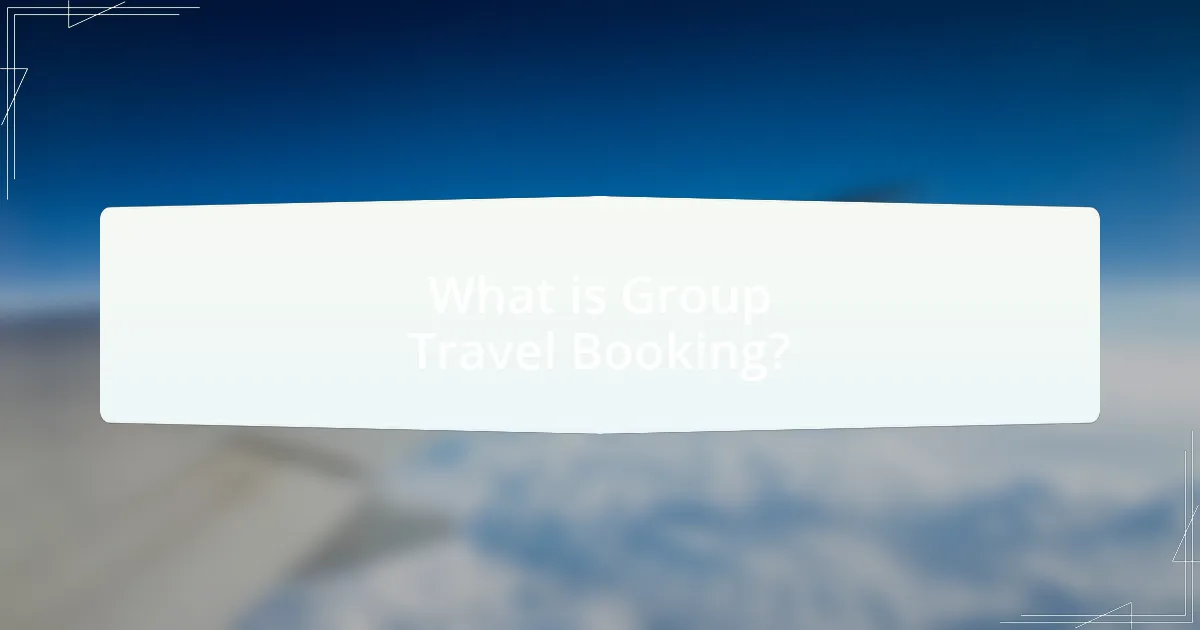Group travel booking refers to the process of arranging travel plans for a collective of individuals, encompassing accommodations, transportation, and activities. This article provides a comprehensive guide on the group travel booking process, detailing essential steps such as determining group size, selecting destinations, and managing logistics. It highlights the financial advantages of group bookings, including potential savings and discounts, as well as the social benefits that enhance group cohesion. Additionally, the article discusses factors to consider when planning group travel, effective communication strategies, and the role of technology in simplifying the booking process, ensuring a successful travel experience for all participants.

What is Group Travel Booking?
Group travel booking is the process of reserving travel arrangements for a group of individuals traveling together, typically involving accommodations, transportation, and activities. This type of booking often provides benefits such as discounted rates, coordinated itineraries, and simplified logistics, making it easier for groups to manage their travel plans. According to the American Society of Travel Advisors, group travel can lead to savings of up to 20% compared to individual bookings, highlighting its financial advantages.
How does the group travel booking process work?
The group travel booking process involves several key steps to ensure a smooth experience for all participants. Initially, the group leader identifies the travel requirements, including destination, dates, and number of travelers. Next, the leader contacts travel providers or uses online platforms to gather quotes and options tailored for groups, often benefiting from discounts for larger numbers. After comparing options, the group leader secures the booking by confirming details and making necessary payments, which may include deposits. Finally, the leader communicates all travel arrangements to the group, ensuring everyone is informed about itineraries and any specific requirements. This structured approach facilitates organized travel for groups, enhancing the overall experience.
What are the key steps involved in booking group travel?
The key steps involved in booking group travel include determining the group size, selecting a destination, establishing a budget, choosing travel dates, researching transportation options, and making reservations for accommodations and activities. First, identifying the number of participants helps in planning logistics effectively. Next, selecting a destination that meets the group’s interests is crucial. Establishing a budget ensures that all members are on the same page regarding expenses. Choosing travel dates that accommodate the majority of the group is essential for maximizing participation. Researching transportation options, such as group discounts on flights or charter buses, can lead to cost savings. Finally, making reservations for accommodations and activities in advance secures availability and often results in better rates.
How do different group sizes affect the booking process?
Different group sizes significantly impact the booking process by influencing availability, pricing, and logistical arrangements. Larger groups often require more advanced planning due to limited availability of accommodations and transportation options, which can lead to higher costs per person as discounts may not apply. For instance, a study by the American Hotel and Lodging Educational Institute found that booking for groups of 10 or more can result in a 10-20% increase in rates compared to individual bookings. Additionally, larger groups necessitate more coordination in terms of itinerary management and communication, which can complicate the booking process. Conversely, smaller groups typically enjoy more flexibility and easier access to last-minute deals, making the booking process more straightforward.
What are the advantages of booking group travel?
Booking group travel offers several advantages, including cost savings, convenience, and enhanced social experiences. Group bookings often come with discounts, allowing travelers to save money on accommodations, transportation, and activities. For instance, many airlines and hotels provide reduced rates for larger parties, which can significantly lower the overall expense per person. Additionally, organizing travel as a group simplifies logistics, as one person can coordinate arrangements, reducing the stress of planning. Finally, traveling with a group fosters camaraderie and shared experiences, which can enhance enjoyment and create lasting memories.
How can group travel save money for participants?
Group travel can save money for participants by allowing them to take advantage of bulk discounts on accommodations, transportation, and activities. When traveling as a group, participants often receive reduced rates due to the collective purchasing power, which can lead to significant savings. For instance, hotels may offer lower prices per room when multiple rooms are booked simultaneously, and airlines frequently provide group fares that are cheaper than individual tickets. Additionally, group activities, such as tours or excursions, often come with discounted rates for larger parties, further reducing overall costs.
What social benefits does group travel provide?
Group travel provides significant social benefits, including enhanced bonding among participants, increased opportunities for social interaction, and the development of teamwork skills. When individuals travel together, they share experiences that foster deeper connections, as evidenced by studies showing that shared activities can strengthen relationships. Additionally, group travel encourages communication and collaboration, which can improve social skills and create lasting friendships. Research indicates that social interactions during travel can lead to a greater sense of belonging and community among participants, further highlighting the positive social impact of group travel.

What factors should be considered when planning group travel?
When planning group travel, key factors to consider include budget, destination, accommodation, transportation, itinerary, and group dynamics. Budget is crucial as it determines the overall feasibility of the trip, including costs for travel, lodging, and activities. The destination should cater to the interests and preferences of the group, ensuring it offers suitable attractions and amenities. Accommodation must be able to accommodate the entire group comfortably, with considerations for location and amenities. Transportation options should be evaluated for convenience and cost-effectiveness, whether by air, bus, or train. The itinerary should balance activities and downtime, allowing for both group experiences and individual preferences. Lastly, understanding group dynamics is essential to ensure that the travel experience is enjoyable for all participants, taking into account varying interests and personalities.
How do you determine the best destination for group travel?
To determine the best destination for group travel, assess the interests and preferences of all group members. This involves gathering input on desired activities, climate, budget, and travel restrictions. For example, if the group enjoys outdoor activities, destinations with national parks or beaches may be ideal. Additionally, consider logistical factors such as accessibility, accommodation options, and available amenities. Research shows that group satisfaction increases when destinations align with collective interests, as highlighted in a study by the Journal of Travel Research, which found that group cohesion is enhanced when members participate in the decision-making process.
What criteria should be used to select a destination?
To select a destination for group travel, consider factors such as accessibility, accommodation options, activities available, budget, and safety. Accessibility ensures that the destination is reachable for all group members, while accommodation options should cater to the group’s size and preferences. Activities available should align with the interests of the group to enhance the experience. Budget constraints are crucial, as they determine the feasibility of the trip, and safety is paramount to ensure the well-being of all participants. These criteria collectively help in making an informed decision that meets the needs of the group.
How does the group’s interests influence destination choice?
The group’s interests significantly influence destination choice by aligning travel options with the collective preferences and activities desired by its members. For instance, if a group prioritizes adventure and outdoor activities, they are likely to choose destinations known for hiking, skiing, or other adventure sports, such as the Rocky Mountains or the Swiss Alps. Conversely, if the group’s interests lean towards cultural experiences, they may opt for cities rich in history and art, like Rome or Paris. Research indicates that group dynamics and shared interests can lead to more cohesive decision-making, enhancing overall satisfaction with the chosen destination.
What are the essential logistics to manage in group travel?
The essential logistics to manage in group travel include transportation, accommodation, itinerary planning, budgeting, and communication. Transportation logistics involve arranging group flights, buses, or other means of travel to ensure everyone arrives at the destination together. Accommodation logistics require booking enough rooms to accommodate the entire group, often at a discounted rate. Itinerary planning is crucial for scheduling activities and ensuring that all group members are aware of the daily agenda. Budgeting involves calculating costs for travel, lodging, meals, and activities to ensure that expenses are covered and shared fairly among participants. Lastly, effective communication is vital for coordinating plans, sharing updates, and addressing any issues that arise during the trip.
How do you coordinate transportation for a group?
To coordinate transportation for a group, first assess the group’s size and destination to determine the appropriate mode of transport, such as buses, vans, or trains. Next, research and compare transportation providers based on cost, availability, and reviews to ensure reliability. Once a provider is selected, book the transportation well in advance to secure the best rates and confirm the details, including pick-up and drop-off locations and times. Finally, communicate all transportation details clearly to the group to ensure everyone is informed and prepared for the journey.
What accommodations are best suited for group travel?
Accommodations best suited for group travel include hotels with group rates, vacation rentals, and hostels. Hotels often provide amenities like meeting rooms and dining options that cater to larger parties, while vacation rentals offer communal spaces and kitchens, allowing for a more home-like experience. Hostels can be cost-effective for larger groups, providing shared accommodations and social environments. According to a study by the American Hotel and Lodging Educational Institute, group bookings can lead to significant discounts, making hotels a financially viable option for group travel.

How can you effectively manage group dynamics during travel?
To effectively manage group dynamics during travel, establish clear communication and set expectations from the outset. This involves discussing roles, responsibilities, and preferences among group members to ensure everyone feels included and valued. Research indicates that groups with defined roles experience higher satisfaction and cohesion, as seen in studies on team dynamics in travel settings. Additionally, regular check-ins during the trip can help address any emerging conflicts or concerns, fostering a collaborative environment. By prioritizing open dialogue and adaptability, group leaders can enhance the overall travel experience and maintain positive dynamics.
What strategies can be used to ensure group cohesion?
To ensure group cohesion, strategies such as establishing clear communication, fostering trust, and promoting shared goals are essential. Clear communication helps members express their thoughts and concerns, reducing misunderstandings. Fostering trust among group members encourages collaboration and openness, which is vital for a cohesive environment. Promoting shared goals aligns individual efforts towards a common purpose, enhancing unity. Research indicates that groups with defined objectives and open lines of communication experience higher levels of cohesion and satisfaction, as evidenced by studies in organizational behavior.
How can you address conflicts that arise within the group?
To address conflicts that arise within the group, facilitate open communication among members to express their concerns and viewpoints. Encouraging dialogue allows individuals to clarify misunderstandings and fosters a collaborative environment. Research indicates that groups that engage in structured conflict resolution processes, such as mediation or facilitated discussions, can reduce tension and improve group cohesion. For instance, a study published in the Journal of Conflict Resolution found that groups employing conflict resolution strategies experienced a 30% increase in satisfaction and cooperation among members.
What role does communication play in group travel success?
Communication is essential for group travel success as it ensures that all members are informed, aligned, and able to coordinate effectively. Clear communication facilitates the sharing of preferences, schedules, and responsibilities, which minimizes misunderstandings and conflicts. For instance, a study by the University of California found that effective communication among group members significantly enhances satisfaction and cohesion during travel experiences. This highlights that when travelers communicate openly about their expectations and needs, the overall group dynamic improves, leading to a more enjoyable and organized trip.
What tools and resources are available for booking group travel?
Various tools and resources are available for booking group travel, including online travel agencies, specialized group travel booking platforms, and travel management software. Online travel agencies like Expedia and Booking.com offer group booking options that allow users to reserve multiple rooms or tickets simultaneously. Specialized platforms such as GroupTravel.org and Travel Leaders Group focus specifically on group travel arrangements, providing tailored services and pricing for larger parties. Additionally, travel management software like Concur and Egencia streamlines the booking process for organizations, offering features such as itinerary management and expense tracking. These resources enhance the efficiency and convenience of planning group travel, ensuring that all participants can coordinate their arrangements effectively.
How can technology simplify the group booking process?
Technology simplifies the group booking process by automating reservations, managing itineraries, and facilitating communication among group members. Online platforms enable users to compare prices, check availability, and make bookings in real-time, reducing the time and effort required for manual coordination. Additionally, tools like shared calendars and group messaging apps enhance collaboration, allowing participants to provide input and make decisions collectively. According to a study by Phocuswright, 70% of travelers prefer using digital tools for group travel planning, highlighting the effectiveness of technology in streamlining this process.
What are the best platforms for managing group travel arrangements?
The best platforms for managing group travel arrangements include GroupTravel.org, Travel Leaders Group, and Eventbrite. GroupTravel.org specializes in organizing group trips, offering tools for itinerary planning and communication among group members. Travel Leaders Group provides comprehensive travel management services, including group bookings for flights, accommodations, and activities, ensuring competitive pricing and personalized service. Eventbrite, while primarily an event management platform, allows users to organize group travel for events, facilitating ticket sales and group coordination. These platforms are recognized for their user-friendly interfaces and effective group management features, making them reliable choices for organizing group travel.
What are some best practices for a successful group travel experience?
To ensure a successful group travel experience, effective communication and planning are essential. Establishing a clear itinerary that includes accommodations, transportation, and activities helps align expectations among group members. Additionally, designating a group leader can streamline decision-making and address any issues that arise during the trip. Research indicates that groups with a defined structure and open lines of communication report higher satisfaction levels, as they can navigate challenges more efficiently. Furthermore, setting a budget and discussing it openly prevents financial misunderstandings, contributing to a smoother experience for all participants.
How can you prepare participants for the trip?
To prepare participants for the trip, provide them with a detailed itinerary that includes travel dates, destinations, accommodations, and activities. This ensures that all participants are informed about the schedule and expectations. Additionally, distribute packing lists tailored to the trip’s climate and activities, which helps participants bring appropriate gear. Inform participants about any necessary travel documents, such as passports or visas, to avoid last-minute issues. Finally, conduct a pre-trip meeting to address questions and foster group cohesion, enhancing the overall travel experience.
What tips can enhance the overall group travel experience?
To enhance the overall group travel experience, effective communication among group members is essential. Clear discussions about preferences, budgets, and itineraries help align expectations and reduce conflicts. Research indicates that groups with established communication protocols report higher satisfaction levels during travel, as they can address concerns promptly and collaboratively. Additionally, organizing group activities that cater to diverse interests ensures that all members feel included and engaged, further improving the travel experience.

Leave a Reply